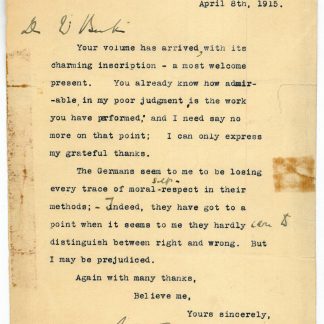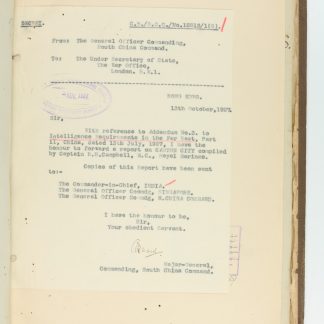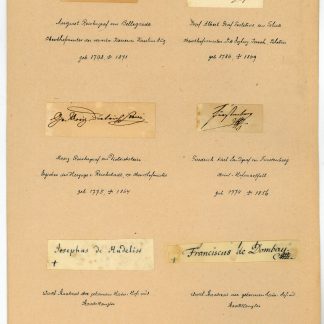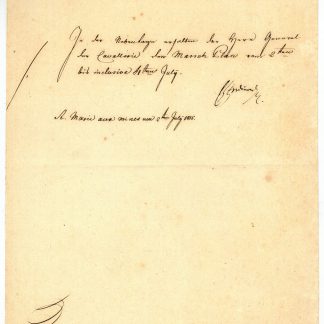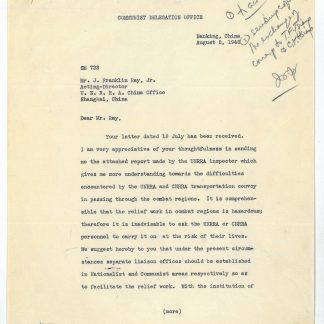"It is comprehensible that the relief work in combat regions is hazardous"
Typed letter signed (in Chinese characters).
4to. 2 pp. on 2 ff. In English.
€ 85.000,00
To the U.S. diplomat J. Franklin Ray, director of the Far East Office of the UN Relief and Rehabilitation Administration (UNRRA), acknowledging the dangers encountered by convoys delivering aid, and suggesting the establishment of liaison offices in both Communist and Nationalist areas: "I am very appreciative of your thoughtfulness in sending me the attached report made by the UNRRA inspector which gives me more understanding towards the difficulties encountered by the UNRRA and CNRRA transportation convoy in passing through the combat regions. It is comprehensible that the relief work in combat regions is hazardous; therefore it is inadvisable to ask the UNRRA or CNRRA personnel to carry it on at the risk of their lives. We suggest hereby to you that under the present circumstances separate liaison offices should be established in Nationalist and Communist areas respectively so as to facilitate the relief work. With the institution of these liaison offices, the relief personnel can carry out their work in cooperation with the local governments and military authorities, without being endangered by travelling between the areas and running through blockade lines and combat regions. Dr. T. F. Tsiang has already associated himself with my suggestion [...]".
With pencil annotations by Ray concerning further action: "We agree & are working actively on this as rapidly as necessary personnel can be mobilized [...]".
One of the principal leaders of the Chinese Communist Party, Zhou Enlai had played a key role fomenting unrest in Shanghai in the 1920s and was one of Mao's most trusted lieutenants by the time of the Long March. He was involved in intelligence and diplomatic work during the war with Japan. Premier of the PRC from its foundation until his death in 1976, he was additionally Foreign Minister from 1949 to 1958.
The letter was written when Zhou was representing the CCP at the Marshall Mission which, under American leadership, attempted to bring about a united government in China following the defeat of the Japanese. The Communists and Nationalists had signed a ceasefire in January 1946 but there was deep distrust between the two sides. By the summer of 1946 there were frequent clashes between Communists and Nationalists, especially in Manchuria, and negotiations were on the verge of collapse. This letter shows Zhou working to ensure the safety of aid convoys on behalf of the United Nations Relief and Rehabilitation Administration (UNRRA) and also the Nationalist Chinese National Relief and Rehabilitation Administration (CNRRA).
J(efferson) Franklin Ray (1905-91) served in several United Nations and State Department positions. He was director of UNRRA's Far East Office from 1945 to 1947; he was also a member of the 1948 and 1949 delegation to the Far Eastern Commission. Most of his posthumous papers are kept at the Hoover Institution at Stanford University.
Traces of rust and pin holes to the upper left corner. Upper edge clipped without loss. Provenance: Stargardt, sale of 12 June 1986, lot 1223. Extremely rare.



